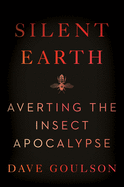
With insect populations down 75% since the early 1970s, Silent Earth author and University of Sussex biology professor Dave Goulson (A Sting in the Tale) issues a solemn warning: without insects, "our world will slowly grind to a halt." Essential to food chains, they also provide vital services such as pollination and decomposition. But in his hard-hitting, passionate exposé, Goulson doesn't campaign to save insects because of what they do for us; that might make an effective argument with politicians, but for him the matter is personal: "I do it because I think they are wonderful." One of his earliest memories is of finding caterpillars on his school playground and raising them into moths. Grateful to have made a living from his hobby, he writes with enthusiasm and, in one-page interludes, celebrates bizarre, breathtaking species like cicadas and fireflies.
The book painstakingly sets out the threats to insects, including pesticides, fertilizer, light pollution, invasive species and climate change. (Most of these factors directly damage human health as well. For instance, Roundup users who contracted non-Hodgkin lymphoma have successfully sued Monsanto.) Statistics and graphs make the case devastatingly clear.
As Rachel Carson did in Silent Spring, Goulson conjures a dystopian future: in post-civilizational-collapse 2080, his son is reduced to a meager existence, with hand-pollination required to produce any food. But this vision doesn't have to come true. An invaluable final chapter gives tips for what individuals, as well as local and national governments, can do to start reversing the losses. Insect-friendly habits can start with our own backyards. --Rebecca Foster, freelance reviewer, proofreader and blogger at Bookish Beck

